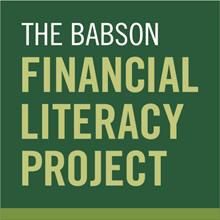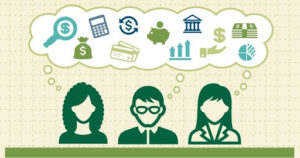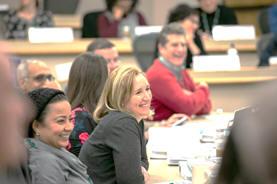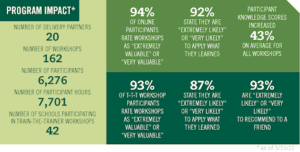
Vision
The Babson Financial Literacy Project (BFLP) is a not-for-profit initiative designed to help teens and young adults acquire the financial knowledge and skills necessary for long-term independence and prosperity in a school or community setting. An important part of the mission is to fill the financial literacy gap for underserved populations.www.babson.edu/financialliteracy
Targeted at high school, community college, and college students and young people in the wider community, the BFLP’s program is deeply rooted in the belief that experiential learning in a group setting offers the greatest promise to improve financial skills and improve their economic outlook. The program uses interactive case studies developed by Babson College finance professors to teach critical financial skills. While exploring real-world financial situations, participants build lifelong strategies for budgeting, building credit, saving for retirement, and more. An online financial knowledge platform supports the program. Participants do not need any financial expertise, and only basic math skills are required.
The BFLP’s program is distinctive:
-
- Expert and unbiased: Seasoned Babson finance professors developed and continuously refresh the program, which is not affiliated with any financial institution.
- Comprehensive: The program covers a broad range of personal finance topics for participants and a toolkit to support coaches.
- Flexible: Organizations can customize workshop topics and delivery. Our content can be delivered by BFLP trainers or by our delivery partners.
- Engaging format and content: Case studies and group discussions help young adults develop their financial skills in a community setting. Online modules complement our workshops.
The BFLP brings financial literacy education to young adults through two channels: directly through workshops facilitated by the BFLP and indirectly through delivery partners, whose staffs or volunteers facilitate workshops. The BFLP works with its partner to design a customized program in both cases. Each organization chooses its workshop participants, the number of and content of personal finance workshops, and the timing and duration of the workshops. Delivery partners that are schools, for example, may offer the program to all students or target specific groups within their student bodies. Partners typically offer four to eight unique workshop topics each year and may repeat those in high demand. Our most popular workshops include Earnings and Your Paycheck, Building a Financial Plan for College, Understanding Student Loans, Tips & Tricks for Managing Credit, Becoming Money Savvy, Protecting You and Your Assets, and Managing Your Money for Your Best Life. More advanced topics include Choosing a Credit Card, Saving for Your Best Life, Investing, Buying a Car, Buying a House, and Understanding Insurance. The BFLP shares its online financial knowledge platform with participants to allow for ongoing independent learning.
The BFLP also helps organizations build financial literacy programs where an organization’s staff or volunteers facilitate workshops. During a six-hour (2, 3-hour sessions) train-the-trainer Bootcamp, participants learn how to design a program that fulfills their educational needs, facilitate the workshops, and develop marketing materials and tools to measure program effectiveness. We provide robust resources, including cases, case discussion guides, PowerPoint presentations, and coach manuals.

Need
An alarming number of people in the U.S. are financially fragile: 46 percent of adults say they could not cover a $400 emergency expense; 43 percent of people with credit cards make the minimum required payment or less each month; and half of American households have no retirement savings. Additionally, financial insecurity has resulted in 45 percent of young adults ages 18-29 reporting that financial stress affects their ability to do their jobs. It discourages young adults from attending college and prevents them from building wealth relative to earlier generations.
Only 23 states in the United States require that students take a financial literacy class in high school. Few higher education institutions, including community colleges, colleges, and universities, have financial literacy education requirements. Organizations that want to offer a program must typically adopt a “do-it-yourself” approach to program design and delivery. Many need help as they are not ready to take on this challenge due to time constraints and knowledge gaps. Additionally, limited funding has prevented many organizations from launching a program.
Adult financial literacy programs offered outside educational institutions are typically online and require self-directed learning. Many people, however, are not aware of their knowledge gaps and aren’t motivated to learn independently. Moreover, many are skeptical of programs sponsored by financial institutions, fearing they are fraught with biases and conflicts of interest.

History
The BFLP was founded in 2016 by two Babson College finance professors and a Babson alum as an initiative of Babson College in Wellesley, MA. The team spent the first 18 months creating, piloting, and fine-tuning the program’s curriculum and offered the first public workshop on a snowy evening in downtown Boston in November 2018.
Since then, the program has gained significant momentum. We facilitated 15 workshops in academic year 2018-2019, 19 in 2019-2020, 62 in 2020-2021, and are scheduled to deliver 88 in 2021-2022. We worked with six delivery partners in 2018-2019, nine in 2019-2020, 15 in 2020-2021, and 39 in 2021-2022. We have educated more than 6,500 workshop participants to date (3/31/22) in 170 workshops.
Early on, the BFLP partnered largely with social service organizations. In 2019, we hired a Program Director and began a significant push into educational institutions, including high schools, community colleges, and colleges. The team realized schools can serve as aggregators of young adults who are already making a significant investment in their future. We received a substantial grant from the Tarsadia Foundation in 2020 to bring financial literacy education to community college and college students in Southern California.
In addition to continuing our previous efforts, the BFLP created several library networks in 2021 and 2022 to bring financial literacy workshops to library patrons. We began offering train-the-trainer bootcamps to help organizations build and deliver their own financial literacy programs. We have worked with more than 42 organizations through our bootcamps to date. We also hired a social media intern to help launch a BFLP Instagram account (https://lnkd.in/eJ8F6CMR) to promote ongoing learning of important financial concepts.
Our goal is to continue expanding by working directly with schools and organizations. We recently hired four professional workshop facilitators who have both content and teaching expertise to support this expansion. Our hope is we can build partnerships with non-profits, such as Parent Teacher Organizations and foundations, to help fund these programs. We also want to continue training staff and volunteers to build and execute programs themselves through BFLP train-the-trainer bootcamps.
Activities
Workshops
The BFLP helps partners design their financial literacy program. Partners identify the financial topics that meet their educational objectives and choose a series of workshops that can be in person or virtual. Some partners offer ongoing weekly or monthly workshops, whereas others provide ½-day or full-day programs. Most workshops are 60 minutes long, although a few are 75 or 90 minutes.
Workshop participants find the sessions to be interactive and feel like community events. They are actively encouraged to ask questions throughout. Workshops generally begin with a short poll that has a few experiential questions. The questions don’t have right or wrong answers, which helps set a conversational tone for the session and lowers participants’ anxiety.
Workshops usually include a 5-10 minute introduction and “lesson” on the topic. Whether facilitators use PowerPoint slides, a whiteboard, or flip charts to capture and share content, they rarely have pre-written “bullets” on their “slides” – only headers. They build a slide’s content by asking participants questions. They add their responses to it. For some workshops, they can use a short cartoon video that covers essential information.
Most workshops then include a short case that introduces a real-world situation to let participants practice their newly learned skills. We do not ask participants to read cases during workshops. Instead, facilitators describe or use a short cartoon video to introduce the case situation. They then lead participants through an analysis of it. If time permits (time is typically tight in 60-minute sessions), they can incorporate breakout groups. Facilitators close workshops by asking participants to summarize key takeaways. They can share a summary sheet of the major points if they are not already included in the case previously distributed. Alternatively, facilitators can give participants stickers that include the key points. The BFLP provides images to partners who want to make them.
Workshops cover diverse topics that are highly relevant for young adults. Sample workshops include:
-
- Tips and Tricks for Managing Your Credit
- Building a Financial Plan for College
- Understanding Student Loans
- Earnings & Your Paycheck
- Managing Your Money to Build Your Best Life
- Saving to Build Your Best Life
- Becoming Money Savvy
- Investing to Achieve Your Financial Goals
- Decisions! Decisions! Everything You Need to Know When On-Boarding at Work
A number of partners offer workshop participants who meet certain requirements, such as attending a minimum number of workshops, completing knowledge gain quizzes, etc., a certificate of financial literacy program completion. Participants receive a certificate that they can include on their LinkedIn page or resume. Some partners also make and give stickers (designed by the BFLP) for each workshop participants attend. The stickers are fun and colorful and include each workshop’s key takeaways.
Online Platform
The BFLP offers organizations an online financial knowledge platform to reinforce and extend face-to-face workshops. The platform includes 20- 30-minute self-study modules, self-tests, a budgeting app, and fun tools that are accessible by computer or mobile device. Most financial topics covered by the cases and case notes have a corresponding module in the online financial knowledge platform. Some educators ask participants to read modules before workshops. Others use modules to reinforce and support concepts previously taught in face-to-face sessions.
The BFLP encourages delivery partners to measure participants’ satisfaction with and knowledge gained from workshops. We help delivery partners launch participant satisfaction surveys and pre-and post-workshop knowledge assessments using electronic polls. We also encourage participants to follow us on Instagram (https://lnkd.in/eJ8F6CMR).
Summer Programs:
1) The BFLP offers summer programs for high school juniors and seniors, as well as college students. Here is a sample program that will be offered in summer 2022.
“How to Manage Your Money in College & Beyond”
Are you a young adult in high school or college looking for help managing your money for the next stage of life? If so, join us for a 4-workshop series that will help you build a strong foundation for your financial future and avoid common money mistakes. Note: BFLP workshops are restricted to participants 17 years or older.
-
- Tips and Tricks for Managing Your Credit Credit cards offer convenience and can help you build a credit profile, but they can be misused. This workshop provides insights into managing credit cards and their hidden costs and tips to avoid credit card traps. Learn about credit reports and credit scores and what steps you can take to improve your financial standing.
- Managing Your Money to Build Your Best Life Paying your bills should be a top financial priority. You’ll also need to save for the unexpected as well as for short-term goals such as a vacation and long-term goals such as retirement. This workshop will help you learn how to budget your money and start building a nest egg for your future.
- Investing to Achieve Your Financial Goals Do you find news about the ups and downs of the stock market confusing? Do you wonder what the differences are between stocks, bonds, mutual funds, and ETFs and how you can start investing? These fun and interactive workshops will help you learn the basics of investing and how to choose investments that make sense for you.
- Protecting You and Your Assets Life as an independent adult can feel very complicated and overwhelming. How can you prepare for the challenges ahead? This case discusses six steps you can take to prepare for the years ahead and protect your well-being and assets.
2) The BFLP also offers train-the-trainer bootcamps to help organizations build and teach their own programs. Here is a sample program that will be offered in summer 2022.
“Financial Literacy Train-the-Trainer Bootcamp”
“Learn how to build a financial literacy program that uses the BFLP’s comprehensive materials to help your students improve their financial knowledge and skills in 2-3 virtual sessions. The program uses our comprehensive, unbiased case studies and supporting materials, including our online knowledge platform. Participants will leave the workshops inspired and capable of championing an interactive, financial literacy program for your students, recent grads, and employees.”

Audiences served
An important part of our mission is to fill the financial literacy gap for underserved populations.
The BFLP teaches and supports teens and young adults when they are facing their first important financial decisions: planning for life, budgeting for their education, deciding what to spend, getting their first jobs, setting saving and investing goals, and applying for credit.
-
- The BFLP educates high school juniors and seniors through our college- and life-readiness workshop series. Students typically attend workshops during economics or business classes or “free” periods. Some schools have used the curriculum during lulls, such as after students take standardized tests or before academic breaks. Workshops typically include: Earnings and Your Paycheck, Building a Financial Plan for College, Understanding Student Loans, Tips & Tricks for Managing Credit, Becoming Money Savvy, and Protecting You and Your Assets.
- In addition to high schools, the BFLP works with community colleges and colleges. Community college students represent 46% of all college students nationally. Many have not had access to financial literacy resources and are disproportionately low-income (68%), multi-cultural (31%), and are the first person in their family to attend college (29%). Colleges are another important target group, given they often lack the resources to develop financial literacy programs on their own.
- The BFLP has also developed delivery partnerships with social service organizations that reach young adults who are not in a higher-education community. For example, we work with the AmeriCorps members of City Year (Boston), who teach and mentor children in inner-city schools, Apprenti, a national tech apprenticeship program, the Boston Public Library, and other Massachusetts libraries to bring financial education to their staff, alums, constituents, patrons, and the public. We also trained staff of several community-action programs that serve low-income people in MA.
Successful impact
The BFLP uses multiple measures to gauge impact. First, we measure program size and reach. Since November 2018 (our first public workshop), our program has served over 6,500 participants in 170 workshops (as of 4/12/22).

Pre-and post-workshop electronic surveys are used to measure knowledge gains. Each survey includes several questions and offers the added advantage of engaging students during the workshop. Since we started measuring knowledge gains this past spring, participant knowledge scores increased by over 40 percent.
Participant satisfaction is measured both quantitatively and qualitatively. Through an end-of-workshop survey, we measure perceptions of a workshop’s value to overall financial knowledge and the likelihood to apply what participants learn during the session. We share a Q.R. code or an online link so participants can immediately answer our short survey on their phones or laptop. To date, 94 percent of participants rate workshops as “extremely helpful” or “very helpful” in building financial knowledge, and 92 percent state they are “extremely likely” or “very likely” to apply what they learned. Some quotes from recent workshops include:
I like you how you kept it simple. Credit cards are daunting, and you made it easier to understand.
I enjoyed how interactive it was and directly applied to our lives.
The BFLP case study on credit cards and credit scores was the best workshop I’ve been to all year!”– Manager, City Year
I learned to save money early in life for retirement! Golden West College student
I’m going to work on paying off my credit card bill on time.– West Los Angeles College student
Recognition
LendEDU recently ranked the BFLP a Top 50 Best College Financial Literacy Program for 2020.
Recommendations for Replication
-
- The BFLP works with delivery partners and coaches to build and facilitate financial education programs that best meet their needs. Each partner designs its program by choosing the financial topics they want to cover and the timing, duration, and location of workshops.
- Workshops can be short, such as one-hour “Lunch and Learns,” or longer, including half-and full-day workshops. Some delivery partners design programs that include ongoing weekly or monthly workshops.
- Workshops may be delivered in person or online.
- Delivery partners also choose who facilitates workshops. The BFLP can supply facilitators for a fee, or the organization can use its staff or volunteers. In the latter case, staff can attend a Train-the-Trainer Bootcamp or learn to facilitate workshops independently. They can then use BFLP coaching materials, including detailed case discussion guides and PowerPoint slides, and coaching manuals. For more information and sample curriculum, please contact us.
Contact Information
Website: www.babson.edu/financialliteracy
Instagram: https://www.instagram.com/babsonfinancialliteracyproject/
LinkedIn: https://www.linkedin.com/company/the-babson-financial-literacy-project/
Contact Person: Robin Kahn, Program Director
Phone: 781.239.4111
Email: BFLP@Babson.edu
To learn more about the BFLP:
Babson, Family Foundation Partner to Build Economic Inclusion for All, Babson Thought & Action, October 7, 2020, https://entrepreneurship.babson.edu/building-economic-inclusion/
Office Hours with Dr. Laura DeVeau, The Overlooked Competency: Financial Literacy, March 9, 2022, https://f.chat/gXQD.
